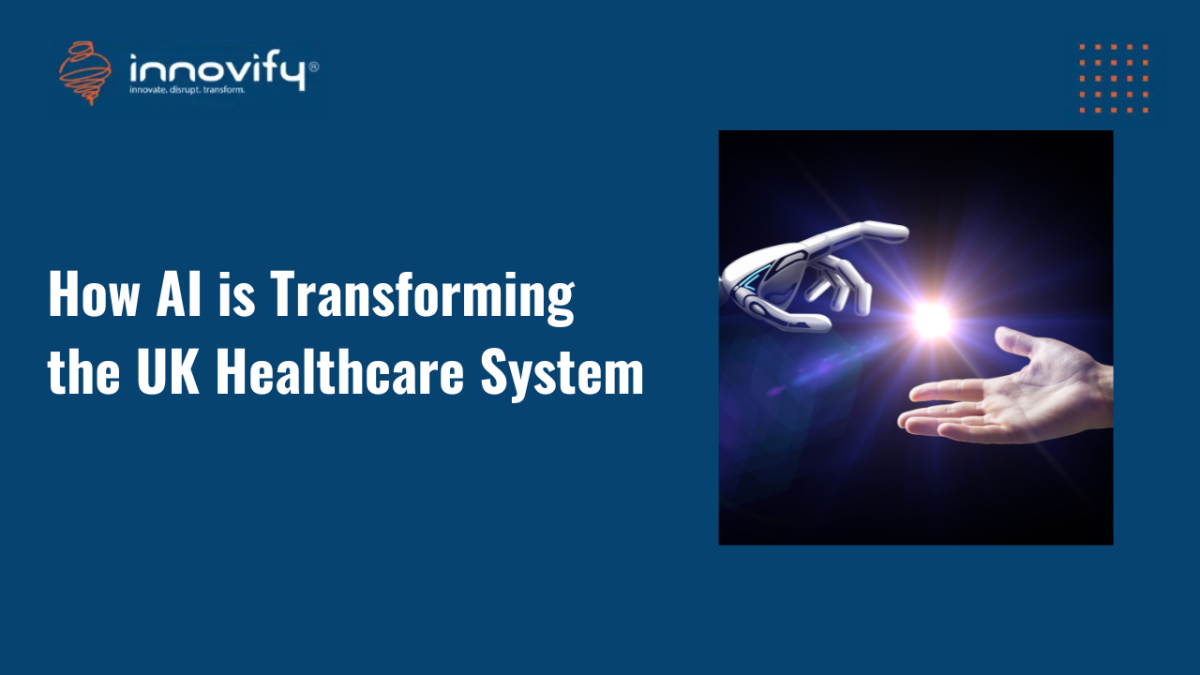AI/ML
How AI is Transforming the UK Healthcare System
Introduction
Artificial intelligence (AI) has the potential to revolutionize healthcare systems across the globe by improving patient outcomes, optimizing operational efficiency, and enhancing decision-making processes. In the United Kingdom (UK), AI adoption is accelerating, with a focus on harnessing its capabilities to address key challenges within the healthcare sector. This blog post will explore how AI is transforming the UK healthcare system, discussing its applications in diagnostics, predictive analytics for resource allocation, remote monitoring and virtual assistants, and the ethical considerations surrounding its implementation.
How is AI being used in healthcare in the UK?
AI is making significant strides in revolutionizing healthcare in the UK, improving patient outcomes, optimizing resource allocation, and enhancing the overall efficiency of the healthcare system. Here’s a closer look at how AI is being implemented:
- Diagnostics and Imaging:
- Image Analysis: AI algorithms can analyze medical images, such as X-rays, MRIs, and CT scans, with remarkable accuracy. This aids in early detection of diseases, reducing the risk of misdiagnosis and enabling timely interventions.
- Cancer Detection: AI-powered systems are proving invaluable in detecting early-stage cancers, improving survival rates. For instance, AI algorithms can analyze mammograms to identify suspicious areas, leading to earlier detection of breast cancer.
- Drug Discovery and Development:
- Accelerated Research: AI can significantly accelerate drug discovery by analyzing vast amounts of data to identify potential drug targets and predict their efficacy.
- Personalized Medicine: AI can help develop personalized treatment plans based on a patient’s individual genetic makeup and medical history, improving treatment outcomes.
- Predictive Analytics:
- Predicting Disease Outbreaks: AI can analyze historical data to predict potential disease outbreaks, allowing for proactive measures to prevent their spread.
- Optimizing Resource Allocation: By forecasting patient demand, AI can help healthcare providers optimize resource allocation, ensuring that beds, staff, and equipment are available where and when they are needed.
- Administrative Tasks:
- Streamlining Processes: AI can automate administrative tasks, such as scheduling appointments, processing claims, and managing medical records, freeing up healthcare professionals to focus on patient care.
- Improving Efficiency: AI-powered chatbots can provide patients with information and support, reducing the workload on healthcare staff.
- Virtual Health Assistants:
- Remote Monitoring: AI-enabled devices and apps can monitor patients’ vital signs and symptoms remotely, allowing for early detection of health problems and preventing unnecessary hospitalizations.
- Personalized Care Plans: Virtual health assistants can provide patients with personalized care plans, reminders, and support, improving adherence to treatment regimens.
- Ethical Considerations:
- Data Privacy: Ensuring the security and privacy of patient data is paramount. Strict regulations and robust security measures are essential to protect sensitive information.
- Algorithmic Bias: It’s crucial to address potential biases in AI algorithms to prevent discrimination and ensure fair and equitable healthcare.
By harnessing the power of AI, the UK healthcare system is poised to deliver more effective, efficient, and personalized care to its citizens. As AI technology continues to advance, we can expect to see even more innovative applications in the years to come.
Hard Figures and Facts
- Government Investment: The UK government has demonstrated a strong commitment to AI in healthcare, allocating £250 million to the NHS AI Lab in 2019. This lab is dedicated to accelerating the development and implementation of AI technologies for various healthcare applications.
- Adoption Rate: Over half of NHS Trusts have integrated AI into their operations, leveraging its potential for diagnostic purposes and administrative tasks. This signifies a significant uptake of AI solutions within the UK healthcare system.
- Market Growth: The UK healthcare AI market is expected to experience substantial growth, with a projected compound annual growth rate (CAGR) of 38.1% from 2021 to 2028. This growth is fueled by increased investments and collaborations between the NHS and AI companies.
- Workforce Impact: AI is poised to revolutionize the way healthcare professionals work. By automating routine tasks like data entry, AI can alleviate clinician burnout and allow them to focus on providing high-quality patient care. Additionally, AI is estimated to save the NHS up to £12.5 billion annually by improving efficiency in administrative and clinical processes.
Funding and Government Initiatives
The UK government has taken a proactive approach to AI adoption, implementing a top-down strategy that aligns with national healthcare priorities. By making significant public investments, such as the NHS AI Lab, the government is ensuring that AI development and deployment are coordinated and focused on addressing key healthcare challenges.
Challenges in AI Adoption
Despite the promising potential of AI in healthcare, there are several challenges that need to be addressed for successful implementation. These include:
- Data Privacy and Security: Protecting sensitive patient data is a paramount concern. Ensuring robust data privacy and security measures is essential to safeguard patient information and maintain public trust.
- Integration with Legacy Systems: Integrating AI technologies with existing healthcare systems can be complex and time-consuming. Compatibility issues and technical challenges may hinder the smooth adoption of AI solutions.
- Regulatory Hurdles: Navigating regulatory frameworks and obtaining necessary approvals can be a lengthy and bureaucratic process. Clear guidelines and streamlined regulatory procedures are crucial to facilitate AI innovation.
Private Sector vs Public Sector Leadership
In the UK, the NHS plays a central role in healthcare delivery. While public-sector initiatives are driving AI adoption, collaborations with private AI companies are also playing a significant role. These partnerships can bring in expertise, resources, and innovative solutions to accelerate AI development in and implementation within the NHS.
Conclusion:
AI is revolutionizing the UK healthcare system, offering unprecedented potential for improved patient outcomes, enhanced efficiency, and reduced costs. From personalized treatment plans to early disease detection, AI-powered technologies are reshaping the way healthcare is delivered.
As the UK continues to embrace AI, it’s crucial to address ethical considerations and ensure equitable access to these innovative solutions. Innovify, a leading company in AI development in UK , is at the forefront of driving this transformation. By partnering with innovators and healthcare providers, Innovify is helping to create a healthier future for all.




